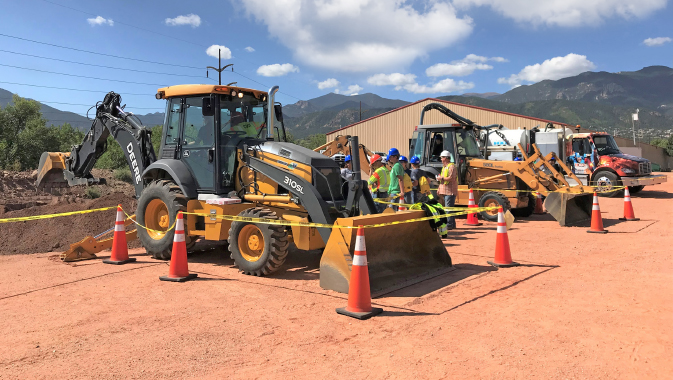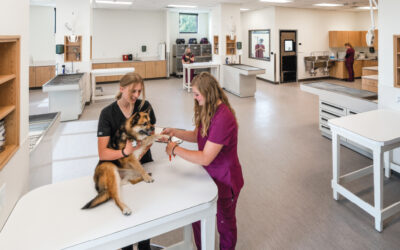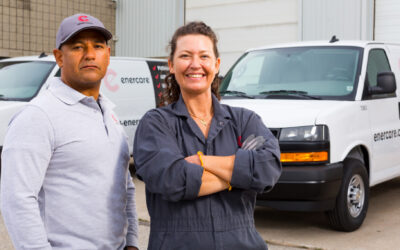As high school students across the country struggle each year with decisions about future options and different paths to follow — to attend college or university, to get a job right away, or something completely different — ABC Rocky Mountain Chapter has a few suggestions to offer. Whether just starting out, looking for a mid-career change, or transitioning from military service back to civilian life, the construction industry has a lot of positive, beneficial attributes for just about everyone.
Education is both time-consuming and expensive, and for those struggling to find the funds to make college a reality, construction careers provide employment with a company where you receive paid on-the-job or classroom training, as you hone skills and learn a trade, all while receiving college credits and often, company-covered tuition to a technical school.
“It’s a very high priority for us, making workforce development within the construction industry one of our strategic goals this year, so we have been looking at forming alliances with education leaders and decision makers to positively change the mindset of how people view the construction industry and to recruit talent into the industry,” says Sabrina Kosmas, Regional Director of Denver & Southern Colorado. With the recently launched resource, the new BuildYourFutureRockyMountain.com website, it’s easier than ever for potential construction employees to learn valuable information about an exciting, skilled and financially viable career choice.
“Not everyone is necessarily meant to go to college,” says Kosmas, “and there are a lot of great, viable career paths within the construction industry whether you do or don’t pursue a college degree.”
As an organization with more than 190 member companies, ABC Rocky Mountain Chapter has been working on how to help those companies hire and train employees that will obtain valuable skills needed to move up the ranks and become future leaders of the industry.
Creating workforce development committees within each region of Colorado has been a huge priority, Kosmas says. Another goal was to form alliances with at least one school district by next year, and they’re excited to have formed alliances with three different school districts within the state, one in each region. “It’s been a huge way to connect with the schools,” says Kosmas.”
ABC has been in a partnership with school districts over the past year, and is excited to do more events through schools in 2020, giving students an opportunity to see there are numerous opportunities in the field. This ongoing initiative has also focused on partnering with pre-existing programs within the workforce development.
“Rather than reinventing the wheel, we’re trying to partner with existing programs,” says Kosmas. “We’re looking to promote it across the board, not just with high school students. We’re also trying to work with younger kids, making more of a positive impression when it comes to construction careers, and also for anyone transitioning career paths or transitioning military veterans. And for a lot of military service men and women who are out in the field and are used to working with their hands and not necessarily being in an office all day, there are a lot of great opportunities out on job sites for them to be doing. If they’re interested in doing something more on the management level, they have a lot of those skills already, too, which is great.”
ABC’s diverse and exciting partnerships also include the Boys and Girls Club. ABC hosted a teen night event featuring different contractors, plus a panel of young people in the construction industry, some who went to college and some who didn’t. After talking to the teens about how they found their way on this career path, teens were encouraged to do hands-on activities. A similar event was held in Denver in August, in a low-income area with 200 kids from ages six to 18, featuring 12 contractors and member companies who offered a variety of different activities for the kids’ after-school program.
“We did everything from building birdhouses and decorating hard hats for the younger kids, to hands-on masonry, finding differences between blue prints, and building bridges with popsicle sticks for older kids. Older teens got to operate actual equipment like excavators and scissor lifts, and they were thrilled!” says Kosmas. “It was great because we had kids walking away excited, talking about how cool construction is. Some had parents in the industry, but they didn’t understand how interesting it is. It was a very cool experience.”
ABC also partners with the Denver Homebuilding Academy, similar to a pre-apprenticeship program, for a job fair featuring thirteen companies — eight of which were ABC members. Within a week of the job fair, six students were hired with three of the members, many of whom were transitioning their career paths. Members have since gone on to hire more than 20 of these students.
Colorado Construction Career Days is another excellent event, bringing more than 600 students from several different states to Colorado Springs, where they are rotated through different activities exposing them to construction careers — everything from hands-on building to operating equipment to sitting down with different companies and talking to them about available opportunities.
“The reaction from the kids is extremely positive,” says Kosmas. “They’re very interested, especially when we have a number of diverse activities. But it’s not only the kids —the staff and school districts we work with love it, too. One of the things that is challenging is connecting with parents; while their kids and schools are accepting of the idea, we need to get parents more engaged as well.”
The stigma of construction work is hard to overcome, says Kosmas. Unfortunately, a lot of people see the industry as the last option, with the notion of being outside in the heat or the snow, or digging ditches and doing hard labour.
“While there are positions like labourers, there is such a variety of other positions that really take a lot of technical skill and a lot of training and a lot of responsibility,” she says. “For so long now, higher education has been pushed on students. For 20 or 30 years, there’s been that push, and that comes with a significant student load deficit. Kids are struggling to pay for college and they don’t realize there are other career options, not just higher education, but schools are making it a priority to go into college instead of the trades or any other industry, really.”
It’s a challenge, she says, but they’re moving in the right direction, especially in Colorado with school partnerships, where forming valuable alliances with different districts and continuing to connect with parents of students when doing outreach at the high school level will encourage students to consider construction as a career path.
Encouraging women to consider a career in construction is another initiative ABC strives to undertake, with a push for minorities as well.
“We’ve talked about trying to partner with [community organizations]. Anywhere we can get involved with young women who are interested in careers, whether in engineering or construction or architecture construction, getting them more passionate and excited, and understanding that it’s not a men’s industry: it’s really an industry for everyone with lots of opportunities.”
Women are also heavily involved in outreach, says Kosmas. “They’re passionate about getting out there in front of kids and young women and young adults and sharing information.”
With the help of the new website launched this year, facts and resources about a construction career are even easier to obtain. With its clean and simple design outlining career options, paths and opportunities, the website hosts a large amount of valuable material.
Statistics are broken down to the most popular trades hiring, annual wages and characteristics that may make you a great candidate for a specific position, such as an electrician versus a welder. It also features pages targeting certain demographics like high school students and military veterans, explains training options, and data about construction management programs.
“Really, the website has two purposes,” says Kosmas. “One is to educate, and the other to connect viable candidates with opportunities. Online charts show how you can move from the high school level to one day being president and CEO of a construction company, and the paths to take and follow. There’s something for everyone, whether you want to go right after high school as an apprentice, or through community college or university. There are paths that can get you there.”













